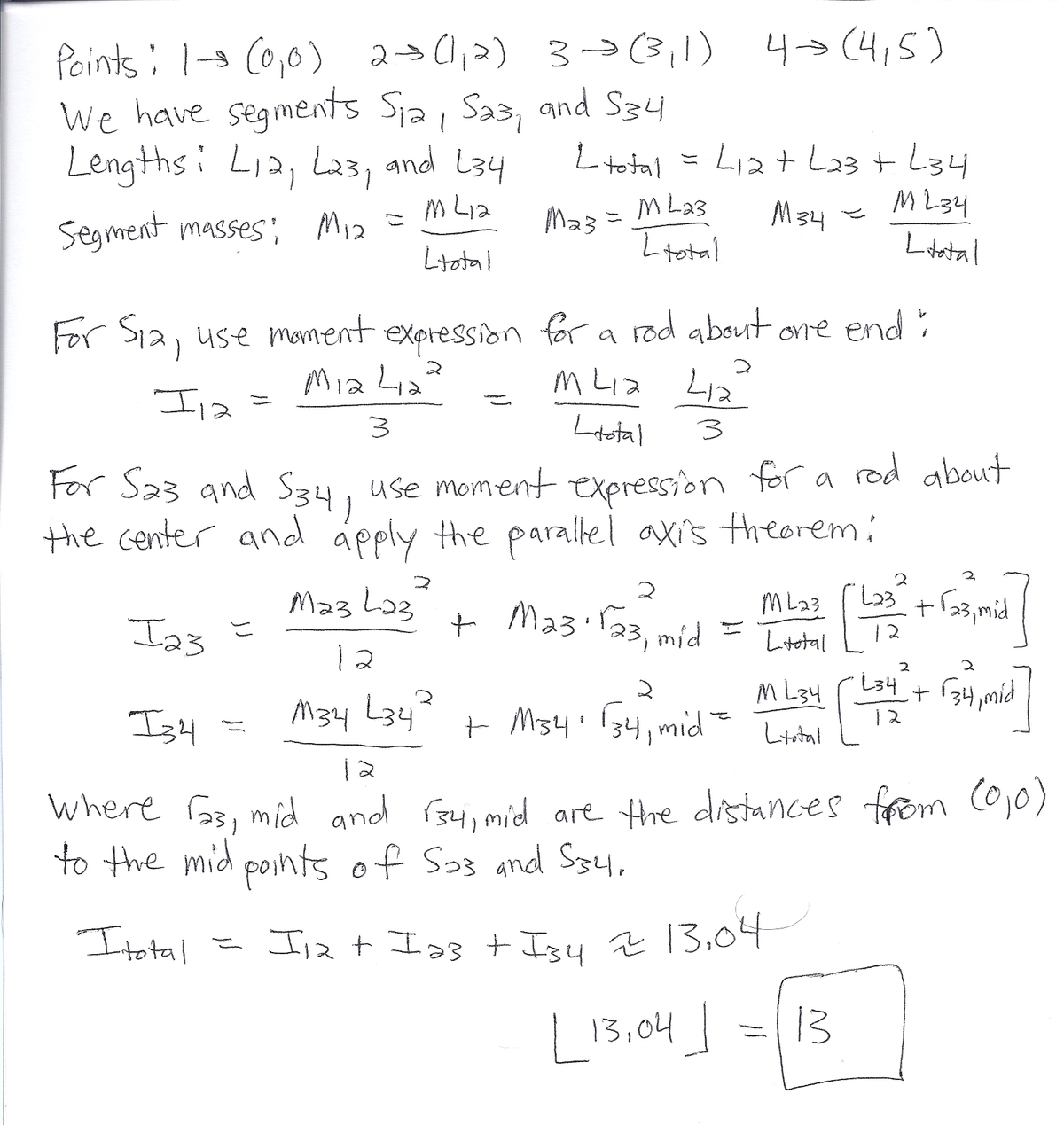Multi-Segment Moment

Consider a three-segment wire with mass M and ( x , y ) vertices as shown in the figure above. The moment of inertia relative to an axis perpendicular to the x y plane and passing through ( 0 , 0 ) can be expressed as α M .
Enter ⌊ α ⌋ as your answer.
Assume that we neglect units.
Notation : ⌊ ⋅ ⌋ denotes the floor function .
The answer is 13.
This section requires Javascript.
You are seeing this because something didn't load right. We suggest you, (a) try
refreshing the page, (b) enabling javascript if it is disabled on your browser and,
finally, (c)
loading the
non-javascript version of this page
. We're sorry about the hassle.
2 solutions

@Steven Chase
after 5-8 years whenever I will launch that software how can I communicate with you.
I don't know your anything like phone number, location.
Maybe at that time Brilliant site will be closed, so what will I do??
Log in to reply
Just Brilliant, so let's hope it keeps going
Log in to reply
@Steven Chase
lets imagine if it gets closed then??
Anything is possible in this world.
Log in to reply
@Talulah Riley – Then it will be game over
Log in to reply
@Steven Chase – @Steven Chase my online maths test is going now, I will reply after 1 hour. Bye
@Steven Chase
–
@Steven Chase
hello ,so i am back ,why game over? ,
i will come to SEL and will say i want to interact with Mr.Chase .
this will be ok to you ?
Log in to reply
@Talulah Riley – No, don't do that
Log in to reply
@Steven Chase – @Steven Chase but what is wrong in that?
@Steven Chase – @Steven Chase why you want to live so secretly ?
Log in to reply
@Talulah Riley – I'll be here on Brilliant. Let's just leave it at that
Log in to reply
@Steven Chase
–
@Steven Chase ok .As you wish.
but one thing which i want to ask is why you want to live so secretly ??
i am a very good guy in my social life.
@Steven Chase Do you add any name in your middle like in my name i have 3 word so in your name , is there any middle word exist??
I initially got this question wrong, but afterwards I obtained a solution. Here it is:
First we denote the point ( 0 , 0 ) to be A , ( 1 , 2 ) to be B , ( 3 , 1 ) to be C and ( 4 , 5 ) to be D . Then, the midpoint of A B is given by ( 0 . 5 , 1 ) with a distance of 5 from A . The midpoint of B C is ( 2 , 1 . 5 ) , with a distance of 6 . 2 5 from the origin. The midpoint of C D is ( 3 . 5 , 3 ) , with a distance of 2 1 . 2 5 from the origin.
Now, we observe that the mass of segment A B , B C and C D are given by ∣ A B ∣ + ∣ B C ∣ + ∣ C D ∣ ∣ A B ∣ M ∣ A B ∣ + ∣ B C ∣ + ∣ C D ∣ ∣ B C ∣ M ∣ A B ∣ + ∣ B C ∣ + ∣ C D ∣ ∣ C D ∣ M
We know that the moment of inertia relative to an axis perpendicular to the x y plane and passing through A can be expressed as ∑ m r 2 , where m is the mass of each point and r is the distance of that point to A . Hence, we have
I = m a b ∣ A B ∣ 2 + m b c ∣ B C ∣ 2 + m c d ∣ C D ∣ 2 = 5 ∣ A B ∣ + ∣ B C ∣ + ∣ C D ∣ ∣ A B ∣ M + 6 . 2 5 ∣ A B ∣ + ∣ B C ∣ + ∣ C D ∣ ∣ B C ∣ M + 2 1 . 2 5 ∣ A B ∣ + ∣ B C ∣ + ∣ C D ∣ ∣ C D ∣ M ≈ 1 3 . 1 2 M
So the answer is 13.
Why are we using 5 with m(ab)? The r^2 I found was 1.25.